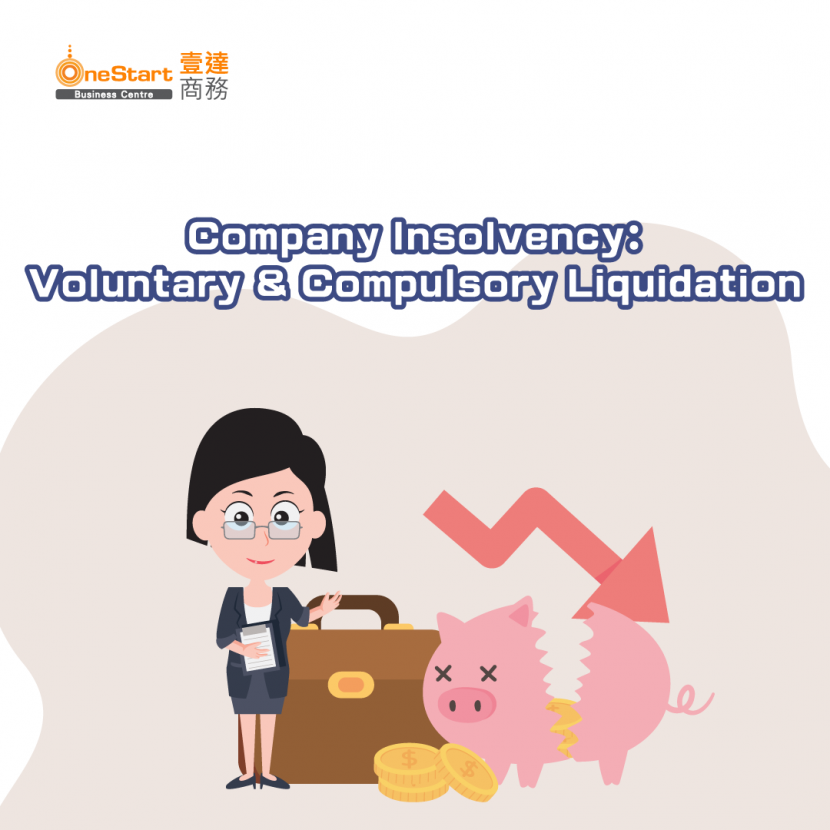Related Article:
【Rising Again!】Company Deregistration Service and Receive 100% Rebate with "Rise Again Vouchers"
What Happens if You Miss the Tax Deadline? How Can You Rectify It?
Table of contents |
In the previous article, we discussed that solvent companies may opt for deregistration to cease operations. But what options are available when a company becomes insolvent? "Liquidation" is a common choice. This article will delve into how insolvent companies can handle their situation, including the processes of voluntary and compulsory liquidation, as well as analyzing the impact of liquidation on the company and related parties. Additionally, we will explore alternative solutions such as debt restructuring, financing, and shareholder funding.
1. Solutions for Insolvent Companies
When a company faces insolvency, it may need to consider a "winding-up and liquidation" option. Only limited companies can apply for or be subject to liquidation.
Difference Between Liquidation and Deregistration
Deregistration refers to the complete cessation of operations and the application for removal from the company register, applicable to companies with no outstanding debts or settled debts. Liquidation, on the other hand, involves the sale of company assets, with proceeds used to repay creditors. Both are methods of closing a business, but they differ in execution and implications.
For more information on company deregistration, refer to: "How to Properly Close a Business? A Detailed Guide for Company Deregistration"
Impact of Liquidation on Shareholders and Directors
Once a company enters the liquidation process, control of the board of directors is transferred to the liquidator, and directors lose control over the company’s daily operations. The liquidator will oversee the sale of company assets and their fair distribution to creditors. Generally, liquidation does not personally impact shareholders or directors unless they are involved in illegal activities (e.g., unlawful gains), in which case they may face legal consequences. Directors deemed unfit for company management due to misconduct may be disqualified and prohibited from acting as company directors in the future and could even face criminal charges.

2. Types of Liquidation
Liquidation is broadly divided into voluntary and compulsory liquidation, each with different causes, processes, and outcomes:
Voluntary Liquidation
- Board Meeting: Pass a resolution for voluntary liquidation and submit relevant documents to the court.
- Shareholders' Meeting: Obtain approval of the liquidation resolution from the shareholders' meeting.
- Appointment of a Liquidator: The company appoints a liquidator to manage the liquidation process.
- Asset Liquidation: The liquidator will liquidate company assets and distribute the proceeds to creditors.
If the company's assets are insufficient to cover all debts, creditors may apply for a "creditors’ voluntary liquidation," which is more complex and costly.
Compulsory Liquidation
Compulsory liquidation applies when a company is unable to repay its debts and has not initiated voluntary liquidation. It is enforced by a court-issued winding-up order. The process includes:
- Filing an Application: Creditors submit a liquidation application to the court and the Official Receiver’s Office.
- Court Ruling: If the court determines the company is insolvent, it will issue a winding-up order and appoint a provisional liquidator.
- Appointment of a Liquidator: The court appoints a liquidator to manage the company’s asset liquidation and distribution.
- Asset Liquidation and Distribution: The liquidator sells the company’s assets and distributes proceeds according to the priority of creditors.
In a compulsory liquidation, the directors lose control of the company, and all decision-making powers are assumed by the liquidator. Compulsory liquidation not only marks the end of the company’s operations but may also harm the company’s reputation and negatively impact the personal credit of related parties.

3. Alternatives to Liquidation
Liquidation is not the only option. When a company faces insolvency, there are other methods to minimize the long-term negative impacts of liquidation. Common solutions include:
- Negotiating Repayment Arrangements with Creditors: Negotiate extended repayment terms to keep the business operational.
- Business Restructuring: Adjust the company’s structure and processes, including eliminating unprofitable divisions and consolidating resources to improve operational efficiency.
- Financing: If the company has growth potential, seek external financing to inject funds, repay debts, and resume operations.
- Debt Restructuring: Under Section 674 of the Companies Ordinance (Cap. 622), propose a debt restructuring plan to creditors, such as extending repayment terms or adjusting interest rates to reduce the burden.
- Selling Profitable Divisions: Sell certain profitable divisions to generate funds to support other business areas and maintain overall company operations.

4. Conclusion
When faced with insolvency, the board of directors must carefully assess the company's actual situation and select an appropriate course of action. While liquidation is a way to end operations and settle debts, it carries significant implications. Companies may initially explore options such as debt restructuring, financing, business restructuring, or negotiating repayment terms with creditors to avoid liquidation and preserve more opportunities.
OneStart Business Centre offers company deregistration services, overseeing the closure and deregistration process We also provide professional services in audit, share transfers, and liquidation arrangements. Our team can serve as your tax representative and provide expert advice. To learn more, call 3575 6888 contact a OneStart business consultant via WhatsApp.
Click to WhatsApp OneStart:
Know More About Our Services:
 |
 |
 |













